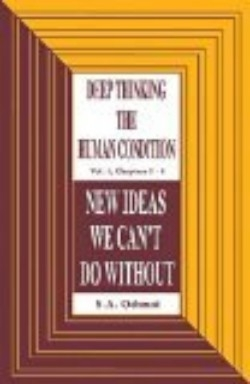Deep Thinking The Human Condition
New Ideas We Can't Do Without
Saving humanity from itself takes both brains and bravery. S.A. Odunsi shows he has both in Deep Thinking the Human Condition. In this first of three volumes Odunsi introduces his readers to the idea that perhaps governments have been approaching the problem of persistent underdevelopment and persistent poverty in the wrong ways and that social science the camp that provided the foundation for the current approach to social issues at a global scale has been doing more harm than good.
Odunsi claims that social scientists have too long been assumed to be the experts on the human condition and are the ones who are supposed to solve painful crises around the globe. But problems within the field—like an ever-increasing number of specialties and a lack of repeatable comprehensive experiments such as those found in other sciences—have led to stagnation in the discipline and an inability to make even incremental headway in helping certain populations rise above their current level of production.
The solution? Promoting functionality among the members of these populations. Odunsi rejects the premise that only in higher education can be found the trade and managerial skills people need to better themselves; functional talents which include leadership and entrepreneurial skills imagination inventiveness and creativity ignite individuals without a university degree. Odunsi offers that the world needs to rethink its dependence on social science and academic credentials.
A few minor style issues may distract readers from Odunsi’s main arguments. In spite of his complaints about academia and its failure to solve the problems of persistent underdevelopment and persistent poverty Odunsi writes in a very academic fashion. He is a skilled writer with well-formed ideas but he may reach a limited audience of readers willing to invest the time and effort it takes to decipher his work; his book is not an easy read. Also Odunsi focuses heavily on the failures of social science and tends to leave his proposed solutions on the fringes of his book. Hopefully this balance will shift in subsequent volumes. Another difficulty is Odunsi’s habit of frequently referring his readers to future chapters for further illumination; this technique may be occasionally useful but turns disconcerting when used so often.
Despite these lapses Odunsi’s book is a valuable addition to the current global discourse. He challenges preconceptions and accepted versions of history and asks his readers to reach further for solutions to the deplorable conditions many people confront in their daily lives. The human population must take care of itself and Odunsi’s book helps strengthen our commitment and brings us one step closer towards an end to poverty.
Reviewed by
Andi Diehn
Disclosure: This article is not an endorsement, but a review. The publisher of this book provided free copies of the book and paid a small fee to have their book reviewed by a professional reviewer. Foreword Reviews and Clarion Reviews make no guarantee that the publisher will receive a positive review. Foreword Magazine, Inc. is disclosing this in accordance with the Federal Trade Commission’s 16 CFR, Part 255.

